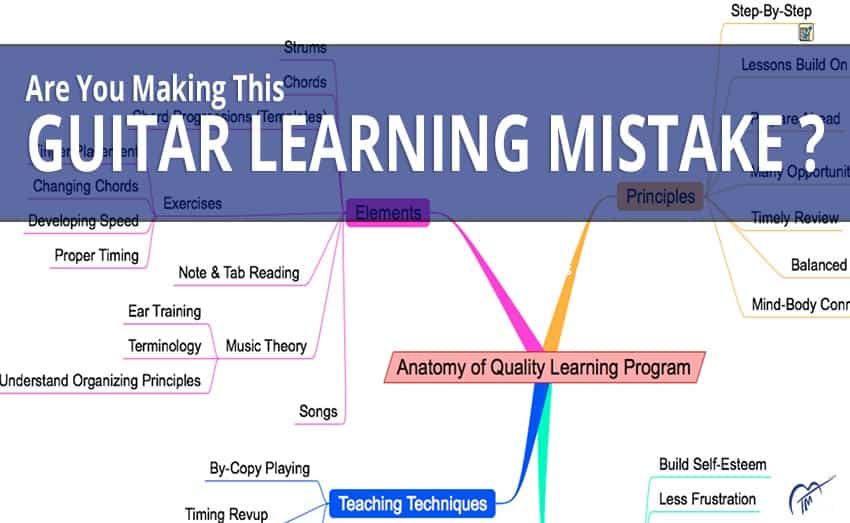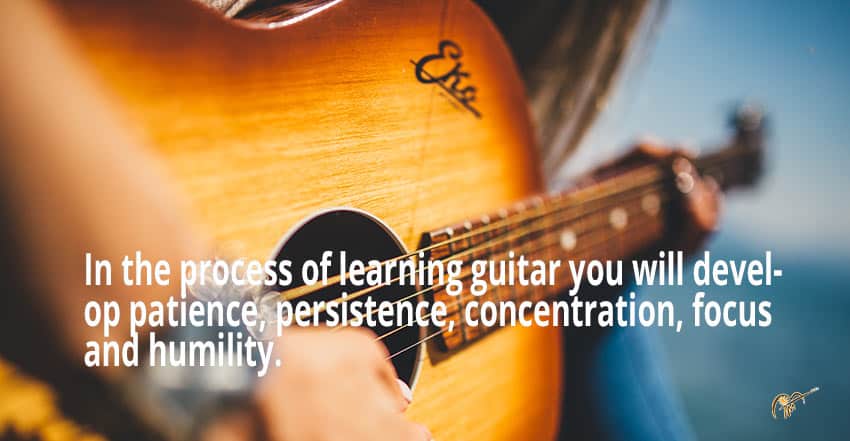
Learning to play guitar is simple. You just buy a decent guitar, find a competent professional teacher, start practicing what she tells you to and don’t stop. It really is that simple.
For years I’ve listened to the hopes and dreams of budding music makers as we sat together in a consultation appointment. They are looking to me, the “professional”, to tell them what they need to do to play guitar with grace and ease. Of course, they are always quick to preface with some version of “I don’t want (read “deserve”) to be famous” or “I only want to play with others if I’m good enough”.
Then, after I implore them to let their imagination rule and assume they did whatever it took, I hear how much it would mean to play and sing a simple love song to their spouse, jam with their friends on the weekend, create a simple song of their own, or retreat after a tough day at work and relax by playing a few favorite tunes on their guitar in the comfort of their own home.
Taking It For Granted
I’m often sincerely touched. Sometimes I’m confronted with how I take for granted this precious gift I have to be able to create, record and perform my own original music. I’m also equally aware that it is not a gift doled out to only a few select anointed people who are born exceptionally “talented”.
Though learning to play guitar really is simple, it’s not always necessarily easy. I hear story after story of how people create or ignore what could be described as “obvious barriers” to learning the joys of expressing themselves through music. I’ve done the same thing myself. It’s from that place that I write this article - both to help you avoid this single most common and insidious pitfall as well to remind myself what I’ve learned and don’t want to ever forget.
Ideally you are reading this either before starting on your musical journey, or at least in the early stages. However, even very experienced guitar players can benefit greatly from the advice that follows.
Looking For The Quick And Easy Way
Everyone is looking for the magic bullet. It’s built into our DNA, and rightly so. I certainly wouldn’t want to be programmed to look for the most difficult way of doing things. Life would be nothing but struggle. Years of evolution has been ingrained in us to look for the easiest and fastest way to get something done. And the marketing world knows it! Need to lose a few pounds? Take a pill or go on the hottest new diet. Want a degree? Sign up online and get it in a quarter of the time. Need a liver transplant? Stop by the new EZ Well Outpatient Clinic and they’ll swap one out and have you home in time for dinner. Oops! Maybe not yet, but I see the marketing potential.
You can blame the advertising world if you want, but they are really just answering to the demand that we as consumers have created. What do you think about these headlines I go off the Internet? “10 Easy Lessons To Play Guitar Like A Pro”? Or this one: “Be A Guitar God In 30 Days”? and “Be A Guitar God In 7 Days” (same company) “Rule the guitar neck by learning the 3 (yes, only 3) killer guitar control secrets”.
Fast, Easy, Fun
Are you ready to sign up? I am. I like fast, easy and fun. And I have signed up. Not specifically to this offer, but others in the past in different areas. The thing is, we all know deep down inside the promise in inherently flawed. Not that the aren’t better and faster ways to learn than others. The flaw is in the concept that there’s a way to get something of value without paying the price.
I say “inherent” because we as human beings place value in things we know are difficult to obtain. The more difficult, the more value. When we watch a musician play a beautiful, intricate passage with ease and grace we know it’s taken years of dedication and practice to be able to do that. It’s the dedication and discipline that we admire, not the notes themselves.
It’s who the person has become in the process, and deep down inside that’s what we want for ourselves. If a robot played the same passage perfectly you might be impressed by the technology, but admiration would not be a part of the experience. We all know at some level that the real value comes through the process.
When telling potential students about how I developed my guitar system I somewhat jokingly tell them that if I could I would put the information on a chip and implant it in their brains. Then they would immediately know what I know and have the skills that I have acquired over a period of 40 years… sounds like fast and easy, maybe not fun. We laugh a little and say that would be great, but I know, even if most can’t express it, that’s not really what they want. What they really want comes from the journey more than the destination.
During the process of learning to play guitar they will confront their fears and inadequacies. They will develop patience, persistence, concentration, focus and humility. Most of all they will experience the self esteem that come from taking on a challenge and following through. They will be a little closer to expressing who they really are to the world. There’s no quick, easy fix that will give them this on any lasting basis. And it’s as it should be. We are often just looking in the wrong place.
Don’t Bypass The Laws Of Nature - Tap Into What’s Already There
What most don’t fully realize is the tremendous powers they already have built in. One of those powers is the ability to break things down to small doable pieces and persistently build one skill on another skill. Another is the incredible power of habit. Once set in motion it tends to take on a life of it’s own for better or worst. You can choose for better. Once you develop the habit of practicing it can be easier to progress than you would anticipate.
Finally, most of us underestimate the power of holding a vision in our minds of what we want and persistently working towards that vision. Developing that “muscle”, so to speak, is well worth the price of admission by itself. Hold a vision, create a plan, break it down into small steps, start working on it, make more decisions as you go, then don’t stop until you are there.
My Daughter’s Story
When my oldest daughter Melanie turned 9 she asked me to teach her to play guitar. I was happy to hear this and I suggested that it would be best if she took lessons from one of my instructors that I employed. My thinking was that she would benefit from a less personal relationship. To my initial surprise she refused and told me if it wasn’t with me she wouldn’t take lessons.
I was recounting this dilemma to a friend over coffee one day. He asked me a question I’ll never forget. He asked “are you sure you want to give up the opportunity to have your daughter listen to you uninterrupted for 30 minutes every week?. Then he asked “what kind of difference could you make in her life if you took that opportunity?” That got my attention and I pondered that question for days.
After a few days I felt compelled to undertake the challenge. I asked Melanie to give me a few months to prepare. You see, playing guitar was important, but I saw the opportunity to do even more. I saw this as an opportunity to teach my daughter life skills that would help her be successful in whatever she wanted to create for herself. The skill in particular I had in mind was the ability to break down a complex project into small sequential pieces and then follow this plan until she achieved a worthy goal. Hold a vision, create a plan, break it down into small steps, start working on it, make more decisions as you go, then don’t stop until you are there.
Preparing The Way
During the months before we started I pretty much locked myself away in my home office and worked for hours and hours with one question guiding me: “how could I organize my guitar lessons to teach this skill?”. The key came to me after a few days. What I needed was a model “blueprint”, in this case for learning the complex skill of playing guitar. By following this plan or “blueprint” she would both learn to play guitar and have a mental model of how to break a complex project into pieces. I had been a guitar instructor for 10 years and was considered quite good, but now I began organizing my materials and creating new ones to fit this new plan.
I applied the Learning Psychology I’d learned in college, from the Yamaha Educational System, a variety of personal development workshops and seminars. Also my years of teaching experience came in handy as well as my experience learning new skills as an adult. After several months I ended up with a step-by-step system.
Each step included some element of playing guitar and followed principles I had outlined from the beginning - 1) each needed to sound somewhat complete by itself and lead to a sense of accomplishment, and 2) it had to be sequential and prepare for more complex material in the future.
I built in a review process as a way to provide every opportunity to master the fundamentals before going on to more complex material. From my experience of teaching I found most students practiced to somewhere around 50% skill level before moving on to new material. If this continues most will eventually hit a wall and gets stuck because they’ve never mastered the earlier material. My idea was to get that to about 70% - 80% before moving on.

Feeling Of Accomplishment
The other principle was to provide a clear built in path to a feeling of accomplishment. When learning a complex skill like playing guitar it is common to feel like you are progressing one day and feel like your at a standstill the next. Sometimes you might even feel like you’ve regressed from the week before. Using the measurement of “feelings” is not a reliable indicator of your progress.
What I set out to do was provide a clear “road map” that you could refer to at any time to see where you are along the path. If you were on step number 5 you could see that you had progressed halfway through and you knew exactly what you had to do to complete the level.
This is more objective than wondering if you are progressing.
The review gives the student a chance to experience their progress. When they go back to the earlier steps most students find that they are easier than they remember them. It’s because they're at a higher skill level. When they practice and successfully play all the steps they usually experience a sense of accomplishment that comes from taking on a challenge and completing it. This prepares them both skill wise and emotionally to a new set of skills and challenges.
Making A Difference
Through my desire to make a difference in the life of my daughter the Starland Guitar System was born. Over the past 20 years I’ve refined it, added to it, developed a teacher training system and even created an online version called Real Guitar Success where I’ve adapted and refined the techniques for learning on the internet.
Melanie took lessons for about 3 years and did learn to play guitar well. She told me later that I was a bit of a task master. Though I don’t remember this she told me when we were at home and she was relaxing I would often remind her she should be practicing. Such is the downfalls of having your dad as your instructor. She did go on to become an enlightened, successful entrepreneur and business woman who is making a difference in the life of emerging fashion designers, visual artists, models and musicians through her company Thread & Seed.
